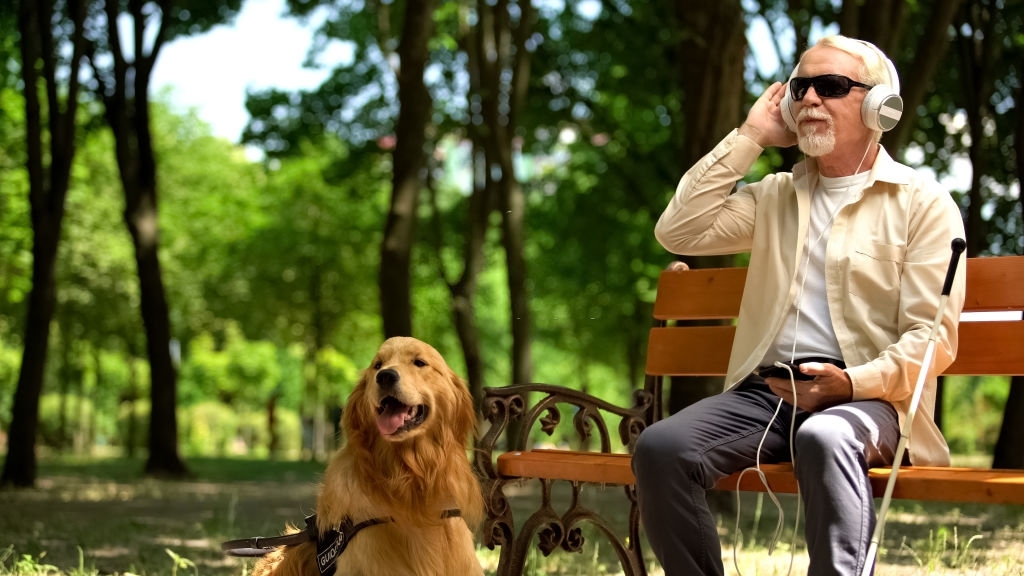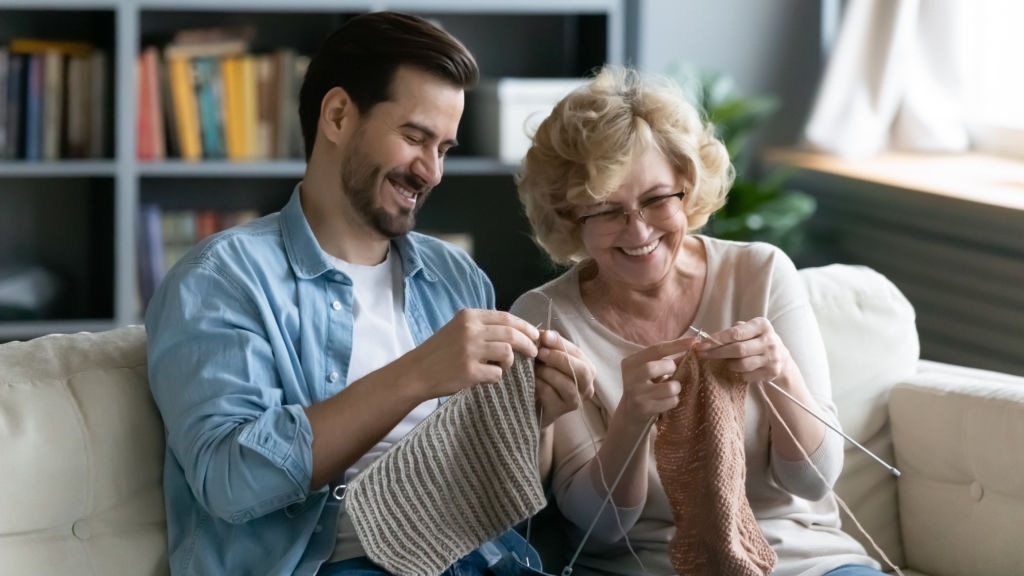The Importance of Sensory Stimulation for Seniors with Dementia

As people get older, their external sensitivities decrease. They are less sensitive to touch, less able to see and hear as well as they once did. For those with dementia, this can lead to a persistent state of mental anguish and agitation.
Dementia is the term used when someone’s brain gets damaged by disease or injury or other change in its function so that it doesn’t work normally. The person may lose memory, language skills, attention span, expected behavior, and personality. So, they can’t do things they used to do and may need help with their everyday activities.
Essential senses such as smell and taste also change for people with dementia. A person who loses her sense of smell will fail to smell toast burning in the toaster. A decreased sense of taste can lead to older adults consuming spoiled foods. The sense of touch is a vital contributor to well-being. An older adult with a lack of sense of touch cannot tell when something is hot or cold. Physical touch is also important for human connections; the deterioration may lead to loneliness and isolation for seniors.
You need to find ways to help them live a peaceful and enriched life. We all want to maintain relationships with senior loved ones. Here at Serenity Senior Care, we’ve compiled some important information on how to keep your senior loved ones interactive, engaged, and calm through sensory stimulation.
What is Sensory Stimulation?
Sensory stimulation is the activation of the senses through physical stimuli. It can include touch, sound, and movement. It can involve calming activities such as music, touch, and soothing; stimulating activities such as colors, pictures, and lights; simple games; or even tasks such as completing crossword puzzles or word searches. Sensory stimulation is important for older adults because it helps improve overall behavior and function.
5 Benefits of Sensory Stimulation

It is a terrific way to improve the quality of life of a senior with dementia. It is used to help seniors with dementia because it can help them live at the moment and connect with their surroundings. We at Serenity Senior Care believe that it is important for your senior loved ones to feel in control of their environment and everyday life. Some of the ways that sensory stimulation can help with this include:
- It makes them feel more relaxed and open to social engagement, which can help improve their mood and behavior.
- Allows seniors to remember past experiences and memories
- Helps them feel more focused and alert.
- Allows seniors to be engaged in an activity that is meaningful to them.
- It promotes better sleep, which can help your seniors feel more energized and improve their overall health.
How to Provide Sensory Stimulation?
It should be practical and realistic, and they should do it with the help of different tools and materials, which aids in stimulating the senses. It should also not involve any risk to your senior loved one. Serenity Senior Care considers it best to use simple activities that your loved one can complete in an easily accessible place in your home or other environments.
Engaging Sensory Stimulation Activities for Seniors with Dementia
1. Auditory Stimulation

It can involve Playing music on headphones, listening to audio recordings of personal memories, and Watching movies on TV with headphones. The advantage of auditory stimulation is that it helps seniors with dementia become more attentive to their environment, leading to better behavior.
Engaging in sounds is a vital part of connecting with the senses. Many seniors with dementia have hearing loss, so it is important to stimulate this sense, don’t forget that adjustments may be needed.
Your loved one can achieve auditory stimulation through different forms of sound, such as
- Music: It is a great way to interact and relax your senior with dementia. We suggest using slow and quiet music for this kind of stimulation, allowing them to relax and be engaged in the activity.
- Quiet ambience: It is the request for a more quiet environment to aid in relaxation and aid in calming your loved one down. Lovely background noise such as the ocean or rain can also aid relaxation and focus for seniors with dementia.
- Telling a story: Telling a story to your loved one with dementia is a nice way to engage with them. It also allows them to recall memories of their past through conversation.
But always remember to keep the sound level balanced as high volume can lead to more problems.
2. Tactile Stimulation

Tactile stimulation is the use of touch to create interest in an activity. You can achieve it by using simple props like toys, soft materials, and even loved ones.
The sense of touch is an important element because it can help your loved ones maintain a sense of comfort and security around them. They need to feel loved and cared for, so these activities are important to maintain their well-being.
Here are some simple ways you can use tactile stimulation in your loved one’s life:
- Laying On a massage or therapy table: It is a nice way to engage with your senior loved ones and help them relax and calm down.
- Laying on a blanket: This blanket can stimulate the sense of touch through the textures on the fabric, such as silk or fleece blankets.
- Make a virtual beach: Encourage your loved one to put some sand in an empty box and fill it with many stones and shells.
Brain paths are stimulated every time your loved ones use their hands to hold or grab something. It causes stimulation for 3000 nerve receptors in each of his finger tips, which send impulses to stimulate the brain.
3. Visual Stimulation

Our vision is one of the important senses that helps us acquire numerous information. But unfortunately, dementia can affect your aging loved one’s visual processing system.
To manage the risk of dementia. Here are some activities you can use to stimulate your loved one’s visual memory:
- Pictures: You can show your senior loved one a picture of themselves from the past or capture video footage of them engaging in activities they love, like gardening.
- Bright Light Therapy: It is one of the most known visual therapy discovered successful in people with Dementia. The key benefits of light therapy include improved sleep cycles, behavioral functioning, minimized wandering, and improved cognition.
- Watching Videos and Movies: It is a great way to engage them in activities they enjoy. Let them watch their favorite shows or movies; it will help bring back the focus from the outside world to what they are currently doing.
4. Olfactory Stimulation

It involves the use of smell to affect a person’s mood or behavior. Many seniors have a hard time remembering important things or what is going on around them. For this reason, it’s important to stimulate their sense of smell as it helps recall memories from the past.
Below are essential oils that are considerably known to have distinctive properties.
- Bergamot: It helps relieve anxiety, elevate mood and calmness, and mild depression.
- Rosemary: It increases cognitive functioning.
- Lavender: It helps to balance strong emotions due to its calming properties.
- Peppermint: It helps stimulate the brain, calms the nerves, and is well-known to rectify absent-mindedness.
5. Gustatory Stimulation

This sense of taste is the fifth sense that helps preserve their memory and aid in appetite and digestion.
- Mashing fresh fruits: It is a great way to help stimulate the senses and aid in cognitive function.
- Fruits: Nowadays, we can buy various kinds of fruity snacks for our seniors with dementia, such as pineapple, mango, apple, berries, etc., which you can place in a bowl of ice cream or yogurt to satisfy their tastes.
- Bland foods: If your loved one still has teeth issues, then mashing vegetables such as carrots can help them feel pleasure by chewing them well.
Final Thoughts
So, now you know what kind of stimulation methods to use for your loved ones. The key is choosing those that can help reduce their symptoms and providing a pleasant environment to live in. We at Serenity Senior Care hope this guide was beneficial and straightforward to use these tips and ideas to help your senior loved ones with dementia stay happy, healthy, and social.


